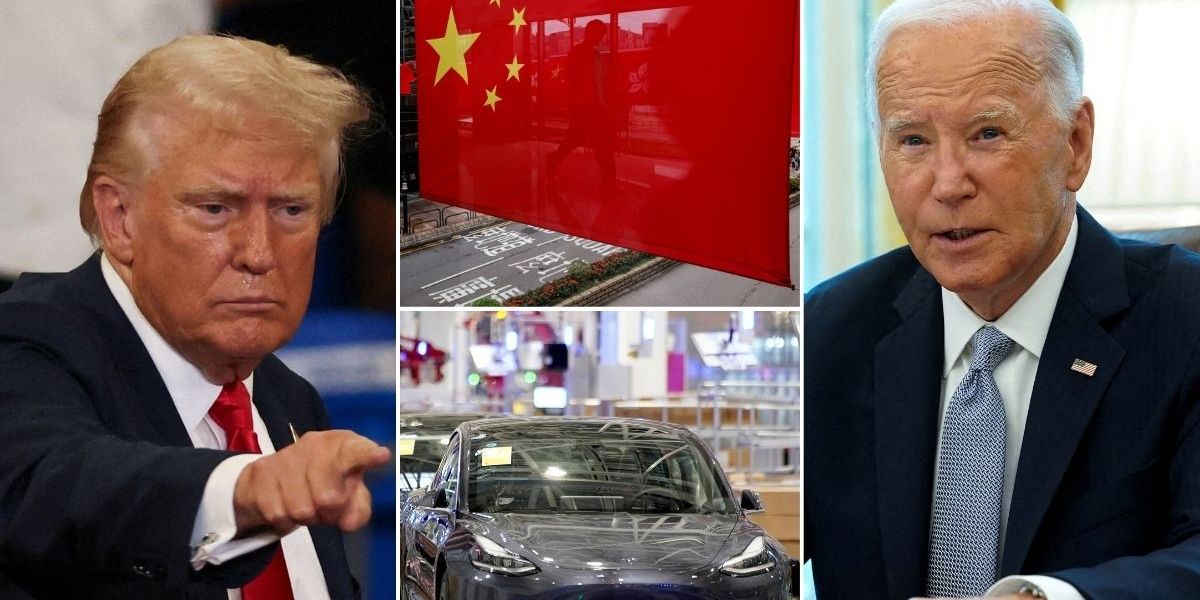The Biden Administration has finalised rules that will effectively ban Russian and Chinese software and hardware in vehicles sold in the United States, in a move that could have a huge global impact.
The Department of Commerce confirmed the measures on Tuesday, which will prohibit Chinese and Russian-made software in new vehicles from the 2027 model year.
Hardware restrictions will follow for 2030 model vehicles, effectively barring most Chinese cars from the US market in response to national security fears.
The sweeping regulations come as part of Washington’s broader crackdown on Chinese technology in American infrastructure.
Do you have a story you’d like to share? Get in touch by emailingmotoring@gbnews.uk
The Biden Administration has confirmed the ban, although Trump could alter the terms later this month
REUTERS
Commenting on the law changes, outgoing Commerce Secretary Gina Raimondo said: “Cars today aren’t just steel on wheels – they’re computers.
“Through this rule, the Commerce Department is taking a necessary step to safeguard U.S. national security and protect Americans’ privacy by keeping foreign adversaries from manipulating these technologies to access sensitive or personal information.”
She emphasised that modern vehicles contain cameras, microphones, GPS tracking and other internet-connected technologies.
The Commerce Secretary told Reuters that the threat was immediate, stating: “It’s really important because we don’t want two million Chinese cars on the road and then realize… we have a threat.”
The final rule targets two key systems in passenger vehicles: the Vehicle Connectivity System (VCS) and Automated Driving System (ADS).
Both hardware and software in these systems will be restricted when designed, developed, manufactured or supplied by entities linked to China or Russia.
The Commerce Department has included some exemptions, notably for vehicles heavier than 10,000 pounds (4,535kg), allowing Chinese firm BYD to continue assembling electric buses in California.
Chinese software developed before the new rules took effect will be permitted, provided it is not maintained by a Chinese company. The department plans to issue separate rules for commercial vehicles in the near future.
A senior administration official warned that malicious access to vehicle systems could allow foreign adversaries to extract sensitive data about drivers and remotely manipulate vehicles.
The official highlighted that connecting mobile phones to compromised vehicle software could give China easy access to user data.
They added that with “potentially millions of connected vehicles coming on the road, each with 10-to-15-year lifespans, the risk of sabotage really increases substantially.”
Threats extend to “sensitive personal data, including geo-location data, audio, video recordings and other live data” collected by vehicles.
LATEST DEVELOPMENTS:
The US launched hefty tariffs on Chinese manufacturers at the end of last year
REUTERS
The new rules could significantly impact several manufacturers, with Swedish automaker Polestar warning in October that the regulations would “effectively prohibit” its US sales.
The Alliance for Automotive Innovation, representing major automakers including GM, Toyota, Volkswagen and Hyundai, unsuccessfully sought an additional year to meet the hardware requirements. General Motors and Ford may still be able to import some Chinese-made vehicles, as long as they comply with the software restrictions.
In September, the Biden administration implemented steep tariff increases on Chinese electric vehicle imports. More recently, the Commerce Department placed CATL, a key Chinese battery manufacturer, on a list of companies accused of aiding China’s military.
The incoming Trump Administration, which takes office on 20 January, has indicated it will maintain pressure on Chinese auto imports. However, Trump is reportedly open to Chinese automakers establishing manufacturing facilities within the United States.



